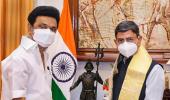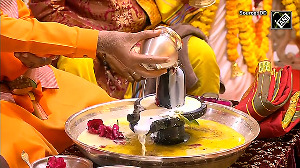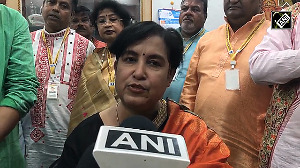The going is not going to be easy for the DMK and its allies in Elections 2024.
Despite the seats sweepstake in the 2021 assembly polls, the vote-share difference of 5.6% (DMK's 45.38% versus AIADMK-BJP's 39.72%) is not insurmountable on a bad day, points out N Sathiya Moorthy.

On the face of it, Tamil Nadu Chief Minister M K Stalin's 'Dravidian model' of development reads like old wine in a new bottle.
But for the man who is stepping into his second year in office on May 7, it is a legacy issue, he having garnered national attention for the century-old socio-political ideology, dating back to 1921.
That was when the Dravida Munnetra Kazhagam's Justice Party progenitor formed the first elected government in the then Madras Presidency and came up with caste-based reservations quota, for the first time in British-India.
Princely Kolhapur was the pioneer, and the Mysore royalty had followed suit.
On the home front, Stalin's first year was at best a mixed bag.
However, the ruling party combine recorded an unprecedented clean sweep in the urban local bodies' elections in February this year, when the government had completed three-fourth of its first year in office.
So to say, the voter's honeymoon with the government was not yet over -- that too despite an early instalment of not-so-very popular decisions pinching the pocket of the proverbial saamaniyan, or the common man.
The ground reality is that the ruling party cannot rest on past laurels, which include the Lok Sabha polls of 2019, state assembly elections in 2021 and multi-tiered rural local bodies polls in between, that too when rival AIADMK was in power.
They need to face the Lok Sabha polls in 2024, which could also set the tone for the assembly elections just two years after that.
A sympathetic media is not saying enough, maybe, but the social media, purportedly identifiable with the rival All India Anna DMK and Bharatiya Janata Party, is unrelenting and unpardoning.
In comparison, the DMK's social media efforts continue to be abysmal, barring the brief run-up to the assembly polls 2021 when Prasant Kishor's I-Pac handled the party's account.
All of it means that an impression is fast gaining ground that the Lok Sabha polls in the state could become wide open as the inevitable anti-incumbency sets in, big or small.
The question is if the BJP's increasing dependence on Hindutva politics, coupled with the DMK's Dravidian model, would decide the Lok Sabha polls for the DMK and allies, as it did in 2019.
Or will the state BJP-AIADMK's repeated reference to allegations of corruption and published incidence of crimes, also involving DMK men, be the clincher?
There are issues and issues, yes. Perceptions of creeping corruption, including at high places, involving some ministers and others, have been doing the rounds.
No one has gone to the courts as during the previous AIADMK government of chief minister Edappadi K Palaniswami (EPS), now Leader of the Opposition in the assembly.
Nor has the traditional media, both print and television, made a big issue of the overnight transfer for Transport Minister S Kannappan, a veteran from the first AIADMK government of chief minister J Jayalalithaa (1991-1996), to a less important portfolio -- and did not ask why.
Stalin began with suspending or sacking many party miscreants, and even got one of them picked up by the police on the very eve of his swearing-in, for pulling down the flex-banner outside an 'Amma Canteen' of the previous government in honour of the late chief minister Jayalalithaa.
Either because his hands are full with administrative affairs of the state, or there are one too many incidents of the kind, no such action seems to have been taken in recent weeks.
Yet, what does it all mean in relation to Stalin's constant reference to an over-arching 'Dravidian model'?
It is a combination of the Justice Party's social justice scheme that translates as caste-based reservations as identifiable in the NEET era, socio-economic initiatives of targeted subsidies/freebies, and emotional issues like language and federalism, which are all acquiring increasing relevance in the context of the individual and the state.
Taken together, it is not different from DMK founder C N Annadurai's slogan that the 'north is prospering and the south is languishing/diminishing', or 'Vadakku vaazhgirathu, therkku thaiygirathu' in Tamil.
But unlike in the times of Annadurai and Karunanidhi, when theirs was a cry in wilderness, today, Stalin's near-similar call easily resonates across several non-BJP ruled states, which all claim to suffer a similar fate in terms of central government jobs and projects.
Like most non-BJP states, the Tamil Nadu government too has problems with the governor, Ravindra Narayan Ravi in this case.
Earlier in the week, Stalin told the assembly that he had received information about the governor having forwarded the twice-vetted NEET-exemption legislation to the Centre for being forwarded to President Ram Nath Kovind, who alone could decide on the matter, as per the Constitution.
While opinion is divided if NEET is good or bad for the state, there is near unanimity in public opinion, including elitist views, that the governor was only resorting to avoidable and unconstitutional delaying tactics by holding back the bill.
In an earlier era, the nay-sayers on one aspect of the issue would have divined reasons to extend it to the other, too.
Stalin seems keen on reviving the campaign for the Karunanidhi era message of 'autonomy for states and cooperative federalism at the Centre'.
The message, 'Maanilathil Suyatchchi, Maththiyil Kootatchi', flowed from the report of the officially appointed Justice P V Rajamannar committee on Centre-State relations, in the early 1970s.
As if to protest against the BJP 'Centre' taking the meaning of the phrase literally, to centralise all powers, the DMK state government has now stuck to a new phrase, 'onriya arasu' in Tamil.
It is a literal translation of the Constitutional terminology that 'India is a Union of States', and also to underscore that there is no such term as the 'Centre' in the statute.
The more local critics, especially of the BJP, criticise the party on the coinage and its perceived implications for national integration, more serious has been the response of non-DMK peripheral pan-Tamil groups, which possibly Stalin's sloganeering has kept under check.
However, there has to be more than coinage and sloganeering to make the Dravidian model appeal to the local masses when they go to vote the next time.
To this end, Stalin has targeted the youth with promise of more jobs, both in the public and private sectors.
The more investment agreements his government has signed with entrepreneurs, from within the country and outside, greater are the number of jobs promised to be created.
However, there are questions about ensuring that most of these jobs, especially in the private sector, went to locals.
Already, there is an undenied perception that most state-centred jobs in the Union government and UPSUs like the railways are going mostly to those from the 'Hindi North'.
Non-governmental labour class jobs especially of the unorganised kind are being taken by those from the East and the North-East.
On-again-off-again, there are social media discourses, citing the Haryana government decision to reserve private sector jobs for locals, and how the high court there had upheld the decision.
Though the DMK state government is not known to be pursing the matter, it may become a major issue ahead of the Lok Sabha polls, especially if someone were to calculate that most private sector jobs in the state too had gone to 'outsiders'.
All these even while a million-plus apply for a few thousand jobs under a given category in the state government , many of them in the officer or clerical class.
Thanks to the Dravidian growth and education model through the past decades, the youth are tuned to taking up skilled and unskilled jobs that are pre-empted for them after being branded 'unemployable'.
The predecessor AIADMK government of Palaniswami and the Stalin dispensation now are thus also focussing much attention on upgrading school and collegiate education in terms of 'quality and quantity'.
This they have been doing even while asserting the state's rights on 'NEET exemption' for medical education, citing the higher levels of healthcare-reach across Tamil Nadu, compared to many others.
Another area Stalin may end up having to focus in the coming months is the restoration of schemes such as free gold for the wedding of girls from poor families and free Scooty-like two-wheelers for female college students.
The former was a legacy from the Karunanidhi era, which Jayalalithaa embellished with additions. The free two-wheeler scheme was Jaya's legacy.'
The free gold scheme is believed to have been scrapped, possibly temporarily, after the new government found a pile-up of hundreds of thousands of applications, which were not serviced during Covid lockdowns, and the impossibility of verifying the genuineness of them all.
The Scooty scheme, the government said, was cancelled after the introduction of free bus travel across the state for all women.
For the rural poor, likewise, the Jaya government had introduced the free supply of milch cows and goats.
The Stalin government has withdrawn the latter, citing fiscal and administrative reasons as it has become difficult to keep track of purchases and deliveries to deserving candidates.
Likewise, the withdrawal of pregnancy hamper of food supplements and medicines for mother and child, at birth, too has not been received well, though no one is protesting.
All this at a time when Stalin has calculatedly targeted women voters, who were traditionally with the AIADMK rival, both under MGR and Jayalalithaa, but not necessarily any more.
His free bus travel scheme and also increasing government funding for women self-help groups across the state are aimed at it.
So, was the decision to cancel interest dues for jewel loans in cooperatives.
But a people who have got accustomed to the subsidies (not freebies) and have got used to including it all in the family budgets, feel short-changed in the face of ever-increasing prices and competing life-style and livelihood expenses.
It is more so in a state with more than 50 per cent urban/urbanised population, with smaller families than in the North and where two-income families have become a norm.
The results are there to see. Tamil Nadu has the highest number of qualified engineering graduates and has the highest per capita of medical doctors, over-shooting WHO norms and competing with Scandinavian countries.
The unexpected euphoria Stalin's ascendancy created overnight has since been supplemented by the popular perception that he wants to do things differently and for the better, and needed to be given time.
His bold move to induct technocrat Palanivel Thiaga Rajan as no-nonsense finance minister and following it up with a five-member economic advisory council of non-Dravidian academics/ administrators is still being appreciated.
Despite some avoidable goof-ups in public speaking initially, Thiaga Rajan is still seen as sincere and firm, the right man at the right place, even if belatedly.
He has helped retain a substantial portion of the early middle-class goodwill for Stalin, and at the same time appeal to new generation voters.
In a way, Thiaga Rajan is the new-face of the 'Dravidian model'.
His persistent arguments against the imposition of the will of the 'Union', not even by leave of the state/states, on finances, Hindi and Hindutva, at the same time propagating the idea party's social justice plank at every turn, even while shunning the forgotten anti-god campaign by wearing his family's religious traditions literally on the sleeves, with a clutch of talisman-threads in different colours, have all stood out.
The rest of his religious belief he wears on his forehead, as a prominent kumkum tilak, without having to be apologetic about it, if it were Karunanidhi's time.
It is Stalin's new brand of Dravidian ideology, where, like his father, he keeps his beliefs/non-beliefs to himself -- but unlike the other, does not fetter his party colleagues and cadres.
Hence, like in the rival AIADMK since Jayalalithaa's time, DMK cadres could be seen wearing their religious marks prominently on their foreheads, to be visible to TV news cameras, too.
Unlike Stalin's ageing mother, his wife Durga is an open temple-goer who also believes in religious rites, and purportedly supports HR&CE Minister P K Sekar Babu's multiple initiatives on temple pujas and administration.
Without anyone asking for it, this combo may have already blunted at lest some of the anti-DMK social media campaigns and open religion-centric accusations, especially by the active and acerbic state BJP President K Annamalai, who may have arrived decades late.
Unlike the common belief elsewhere, Tamil Nadu has never voted on issues of religion, for or against, but only on concerns of social justice, social sector subsidies and, of course, on Tamil language and identity, both evolving -- constitutionally -- into federalism discourse and the rights of the states.
However, avoidable issues do keep cropping up, now and again.
They are unlike the strategic shift from the traditionally Brahmin/Sanskrit-centric Hindutva campaigns against the DMK into those focussing on Tamil language and 'Tamil gods' like Murugan under Annamalai's predecessor, L Murugan, now Union minister.
Under the Stalin-Sekar Babu dispensatio,n a combination of factors have conspired under their very nose to trigger religious controversies where none might have existed.
The latest is the controversy over the state government denying permission to the 16th century Dharmapuram Adheenam, one of the high seats of Saiva Sidhandha practices, to discontinue the practice of devotees and others carrying the new mutt head on a palanquin, claiming it was against 'Tamil culture'.
The BJP's Annamalai and the likes of the Madurai Adheenam, who since ascendancy in August last, has been mouthing pro-Hindutva and anti-DMK political lines, after his late predecessor had politicised the mutt with his pro-Dravidian, pan-Tamil outpourings, including on controversial Sri Lankan ethnic issue, Hindi imposition, etc.
As coincidence would have it, before the Adheenam issue, which is still wide open, there was the government takeover of the Ayodhya Mantapam, related properties and the managing trust, under an order passed by the erstwhile Jayalalithaa government and upheld by the Madras high court recently.
While the DMK failed to take the message that the Stalin government was only executing a court order, and to Jaya should go the real blame, the high court in double-quick time, restored the properties to the petitioner-trust.
After the urban local bodies' polls, Stalin has sought to make a huge change to the age-profile of the party at the lower-levels.
Most party mayors, municipal and panchayat union chairpersons are young, many of them women with high educational qualifications.
For the prestigious Chennai Corporation, the DMK has a young Dalit woman graduate as mayor.n Priya Rajan is the granddaughter of the late party veteran 'Chengai' Sivam.
Likewise, for the adjoining municipal corporations of Tambaram and Kanchipuram, too, the party has young women as mayors, both professionally qualified and gainfully employed until recently.
There are issues of male relatives, especially husbands, of women civic body chiefs and members, throwing their weight about, both in urban and rural areas.
The party and the government have acted strongly against such infringements.
However, Stalin could not act against errant and over-ambitious DMK cadres upsetting the post-poll alliance deal on the sharing of indirectly-elected civic body chiefs' positions.
After sacking some of them, the party has given up on the rest. The allies are not happy.
Stalin's real test in making the 21st DMK look and think young will come if and when he tries his hand at stripping veterans from his time and earlier, of their self-importance, attendant arrogance and wayward behaviour with cadres and voters alike.
It had brought a bad name to the party through the previous decades, yet until now, Stalin needed them to ensure a smooth and uncontested transition from his father's era.
Having won two elections in a row, in 2019 and 2021, on his own steam and changed public perception on that count, the new CM took bold steps to confine old-timers, most of whom were also past their prime in terms of age and ideas, to less significant ministerial positions than they had hoped for.
After sweeping the urban local bodies polls, he was expected to sweep the party clean, but has stopped thus far with shifting senior minister Kannappan out.
More heads would have to roll if Stalin has to retain his positive public image, but it is a huge political risk that he is not willing to take -- also because of his nostalgic sentiments for many of them, who had stuck to the party and Karunanidhi, personally, through difficult times.
They too do not seem to be reading the writing on the wall -- which is as much for the party as for themselves.
The party would live beyond them, and should retain and build up on the new vigour that Stalin has been able to inject and imbue.
Does it mean that Stalin is in a hurry to induct his politician-son, Udhayanidhi Stalin, at present the DMK youth wing chief, into the cabinet as early as the commencement of his second year in office (as a section of social media has been going viral about)? No.
More than being speculative, DMK insiders identify such campaigns to their political rivals.
However, more the number and frequency of such out-of-turn 'malicious' campaigns, greater will be the ease with which the already-tired common man would accept Udhayanidhi's ascendancy, whenever it happens.
Yet, the going is not going to be easy for the DMK and its allies in Elections 2024.
Despite the seats sweepstake in the 2021 assembly polls, the vote-share difference of 5.6 per cent (45.38 per cent versus 39.72 per cent) is still not insurmountable on a bad day.
It was still a much higher margin than the predecessor AIADMK's one-per cent lead in elections 2016 (41%-40%), when the party won 134 seats on its own but under Jaya, against the DMK combine's 98.
However, increasing obsession with his controversial father's contributions by erecting a statue and renaming the arterial East Coast Road after him, all could end up irritating the urban youth who had voted for him and who may not have other reasons to deny him another.
The high-point could be reached if, as speculated in a section of social media, Stalin ends up shifting the government secretariat back to the massive mausoleum-like building in black marble, which Karunanidhi had seemingly identified with the 'colour of the Dravidian people', when he got it built in his last term as CM (2006-2011).
A vengeful Jayalalithaa as successor promptly converted it into a super-speciality hospital for the poor and needy from across the state.
The hospital has served its purpose through the past decade or so, and more so at the height of the Covid pandemic.
The current speculation about re-shifting the secretariat flowed from Stalin laying the foundation stone for another multi-speciality hospital of near-similar size, not far away from the present one, and yet not declaring that it would only be an additional facility.
Yet, aware of the unavoidable share of anti-incumbency over the coming months, Stalin has not discouraged the on-again-off-again friend-foe in the PMK from displaying its willingness, though not outright eagerness, to get closer to the DMK, in time for joining the party-led combine in elections 2024.
Despite political ups and downs, the PMK has continued to command an unwavering five per cent vote-share whenever it contested alone, from the maiden electoral outing in 1991, at the height of the Rajiv Gandhi assassination.
If the alliance comes through, that should be able to hold the margin, the DMK surmises, though in private and for now.
The fact, however, remains that on all matters Dravidian, the PMK too is on the DMK's pan-Tamil plank, like the rest of the ruling party's existing allies.
Against this, the rival AIADMK camp is riven with factionalism of every kind at every level, more than while in power.
The AIADMK's ideological differences with the BJP ally from the past is known, and the party still believes that they lost the 2019 Lok Sabha polls so very badly only because over-identification with the party ruling the Centre, then and since.
Though the BJP's Annamalai is stealing headlines from both the AIADMK on the one hand and the peripheral NTK actor-founder Seeman, on the other, the Tamil voter has to still get used to the idea of voting outside of the two Dravidian majors.
This is an added advantage for the DMK just now, as the AIADMK would still need the small additional vote-share that the BJP could bring in, especially in the mutually-strong southern and western districts, but cannot have the party as a co-traveller, owing to the latter's Hindutva imagery!
N Sathiya Moorthy, veteran journalist and author, is a Chennai-based policy analyst and commentator.
Feature Presentation: Aslam Hunani/Rediff.com











 © 2025
© 2025